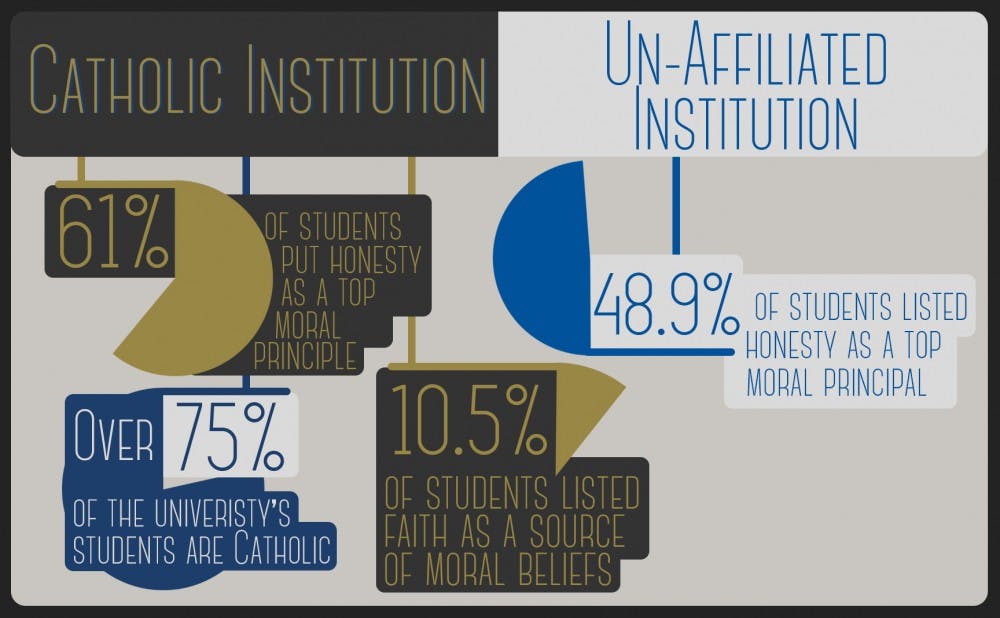College students may not be as morally bankrupt as popular culture makes them out to be.
A study conducted by researchers at Duke's Kenan Institute for Ethics and the Center for Social Concerns at the University of Notre Dame found that honesty and respect were the most frequently mentioned moral values cited as important by undergraduate students. The project took place over the course of three academic years with a grant from the Teagle Foundation, beginning in 2013.
“Teaching Duke undergraduates and working with student research teams, I knew anecdotally that students are often wrestling with moral and ethical issues,” wrote Amber Díaz Pearson, a research scholar at the Kenan Institute for Ethics, in an email. “I was excited to be part of a structured research project that would let us hear how students think about these questions in their own words."
The study conducted was aimed at understanding how students view the meaning of living an ethical or moral life.
“These questions of morality and ethics are relevant to college students’ lives although many college students already have a fairly well-developed sense of moral identity, which is encouraging,” said Tara Hudson, a postdoctoral research associate at Notre Dame who was involved in the study.
Data was collected through an electronic Qualtrics survey, which was distributed to students at two universities. Both of the universities selected were private institutions—one is affiliated with Catholicism and the other is not officially affiliated with any religion. The identity of these universities remains anonymous as an extra layer of confidentiality for the respondents.
Unlike traditional surveys, the study offered students the opportunity to enter multiple values in identifying the moral principles they most value. The researchers subsequently analyzed students’ answers by conducting a simple word-frequency analysis to see which terms came up the most.
Altogether, 61 percent of undergraduate students surveyed from the Catholic institution said that honesty was one of their top moral principles while 49 percent of students at the independent institution included honesty in their responses. The percentage of students who listed “respect” was much more aligned between the two universities—31.1 percent of students at the independent university mentioned respect compared to 30.5 percent at the religiously-affiliated university.
“It may be a little surprising the extent to which [these two values] appeared above and beyond all the responses,” Hudson said. “Honesty is just one of those values that’s shared by everyone regardless of your faith, spirituality or background.”
Hudson added that one of the most interesting aspects of the research was that the values listed by students at the faith-based school were not as reflective of the Christian faith as expected.
Hudson said it was shocking that only 10.5 percent of participants at the Catholic-affiliated institution mentioned the word “faith” as one of their core moral beliefs. This particular institution has a student body which is 75-80 percent Catholic, Hudson noted.
One major difference between the two institutions’ responses was that 12 percent of students at the Catholic university mentioned justice, fairness or "treating others the way one wants to be treated" in defining what it means to lead an ethical life. Only five percent of students at the non-religiously affiliated institution mentioned this.
However, Hudson said she was not too surprised by this because Catholic practitioners often emphasize “the golden rule.”
The study also showed how peers may act to influence students’ moral values. Students frequently used “other-centered” language—over 50 percent of students at both schools mentioned other people and their needs when describing what a moral life meant to them.
“These respondents described moral and ethical living in terms that took seriously the needs of other people, revealing themes of altruism, respect, justice or avoiding harm,” Pearson wrote. “For example, one student explained: ‘To lead an ethical/moral life is to value other people for their intrinsic value, to not reduce them to pawns in your own life.’”
By conducting this study, Hudson said that she and her team ultimately hoped to identify how morality and its associated values may tie into the education process. She explained that the study's findings could be implemented by educational institutions seeking to infuse questions of morality and ethics into their curriculums.
“Our goal is to publish what we found so that educators, and especially those who work with college students, can start to think about how these issues apply to the work they do with students,” Hudson said.
Looking to the future, Pearson said she would like to explore how these carefully-developed ideas about morality and ethics may be manifested in everyday student behavior.
“These students know what their values are, but do they consistently act on them?” she said.
Get The Chronicle straight to your inbox
Signup for our weekly newsletter. Cancel at any time.

